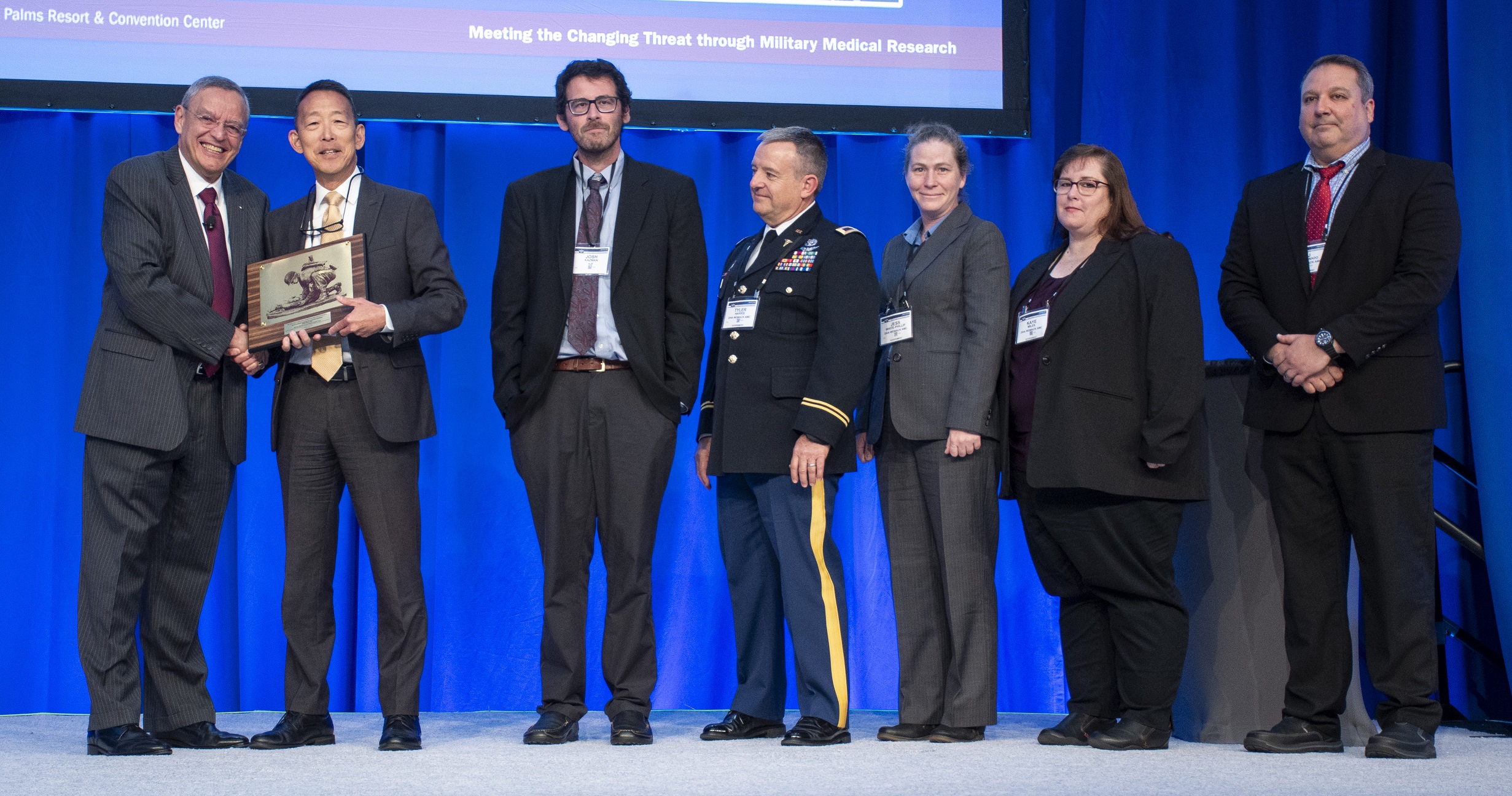
Medical Assessment and Readiness System: Womack Army Medical Center hosted MARS system sets a new pace for military clinical research
By Staff Report, posted Sep 26, 2024 on BizFayetteville.com

A Womack Army Medical Center (WAMC) based clinical research team has received federal and nationwide recognition for their outstanding contribution to military clinical research. On Aug. 26, the team behind the Medical Assessment and Readiness System (MARS) was recognized with the Outstanding Research Accomplishment award at the 2024 Military Health System Research Symposium (MHSRS) in Kissimmee, Florida.
Six members of the team were able to accept the award in person for their work titled, “Big Data and Machine Learning for Full Spectrum Military Health Readiness, Performance, and Care,” which delved into the key impacts of the MARS.
The system itself is the result of years of research and partnerships dedicated to furthering research on the readiness of the nations warfighters, and changed many hands before becoming the main responsibility of the current eight person core team at WAMC.
MARS became fully functional at WAMC located on Fort Liberty, NC in January 2020. The original database was created by the Army Office of the Surgeon General (OTSG) in 2011 at the University of Chicago’s Pritzker School of Medicine.
Its primary purpose was to provide medical readiness data in the form of the Medical Readiness Assessment Tool (MRAT), which later became embedded into the Army’s Medical Operational Data System to allow providers and commanders to see a soldier’s medical readiness to deploy. It thus became the first predictive analytics solution to service member medical readiness forecasting.
In 2016, subsequent OTSG personnel assigned to maintain the MRAT program were not well-positioned to conduct the requisite clinical research activity needed to validate and enhance the system. This began a four-year process of regulatory approvals for WAMC to acquire this database with the support of their partner, The Consortium for Health and Military Performance (CHAMP) of the Uniformed Services University of the Health Sciences in Bethesda, MD.
MARS is now a repository continually updated to capture longitudinal sociodemographic, clinical and administrative statuses. It has two fully dedicated research servers, full system access clearance for its database managers and data scientists, complete Institutional Review Board and HIPAA approval and fully executed data sharing agreements with the Defense Health Agency and other Department of Defense (DoD) organizations.
In an informational video about the MARS system released by the Military Health System Research Symposium, the WAMC’s MARS team was able to provide an overview of the barely tapped potential of the system.
“It is a massive database. Currently we have over four million soldiers in it over approximately 20 million observation years of data,” said Y. Sammy Choi, MD. Dr. Choi serves as senior advisor within Department of Clinical Investigation for WAMC. “It is a system that incorporates official data from DHA and DoD. We have complete data sharing agreements,” he continued.
The longitudinal datasets permit retrospective observation of health and military career trajectories for over 15 million person-years of active service. Over 100 variables are available for analyses to include demographic and anthropomorphic data, body composition and vital signs, diagnostic and procedure codes from direct and purchased care, complete health record data to include laboratory and imaging results, deployment history, military occupational specialty, unit assignment, promotion history, medical profile data and standard testing such as physical fitness and weapons qualification scores.
“We can look at trends and patterns over time. We can look at the effects of policy changes. We can look at how treatment interventions in subpopulations have changed and improved our return to duty rates,” said senior scientist for the Department of Clinical Investigation at WAMC Dr. Jessica White-Phillip. “What we’re looking at is, are our soldiers ready? What are the factors that impact soldier readiness, resiliency and return to duty?”
ACCORDING TO THE MHS AWARD SUBMISSION WRITE UP PROVIDED BY THE MARS TEAM, SPECIFIC IMPACTS OF THE SYSTEM INCLUDE:
- The ability to produce rapid analysis for senior leaders.
- Rapid turnaround for short research deadlines for learners.
- Large data analytics that are deemed “exempt research” thereby bypassing months of regulatory requirements.
- Proven high potential to affect policy and procedure.
“It provides business analytics. As an example, I can determine the outcomes of care and how much we pay if you’re in the Fort Liberty region. But it also can compare Womack to other MTFs (Military Treatment Facilities) or Womack to other regions. So there's a lot of policy that comes out to the DoD, and of course to the DHA. But we think we can provide a data driven approach. We have the ability to change procedure and maybe more importantly, change policy,” shared Dr. Choi.
“We’re looking at the potential in the near future for large scale combat operations. And one of the things that makes the most difference for combat power is returning soldiers to duty after injury. And MARS is a huge database that has millions of records of soldiers who have been injured, what their treatment was and what their eventual return to duty status became,” shared COL. Tyler Harris, chief of the Department of Clinical Investigation at WAMC.
During the 2024 Award cycle for the MHSRS, data from the MARS has been used in numerous studies, student research, publications and oral and poster presentations on Fort Liberty and beyond.
The research team at WAMC remains dedicated to using the MARS to further enhance the skills of military medical professionals to maintain soldier readiness, improving patient care and returning soldiers to duty faster, better and stronger.
Copyright © 2026
Enhanced Media Management Inc. dba
Greater Fayetteville Business Journal
This story may be displayed, reformatted and printed for your personal, noncommercial use only and in
accordance with our Terms of Service located at https://bizfayetteville.com/useragreement.